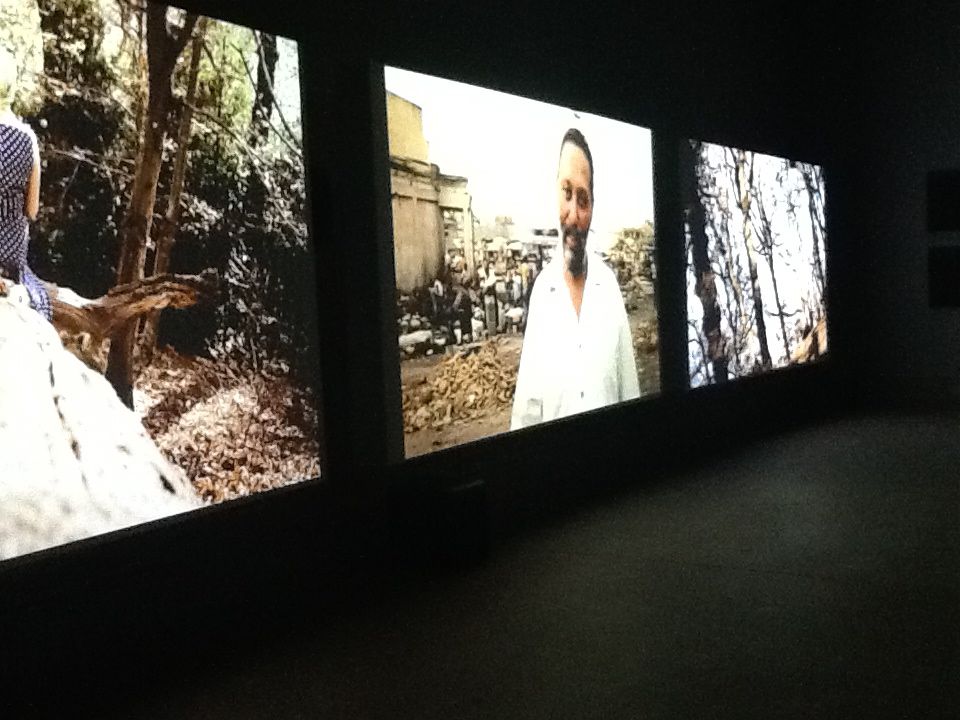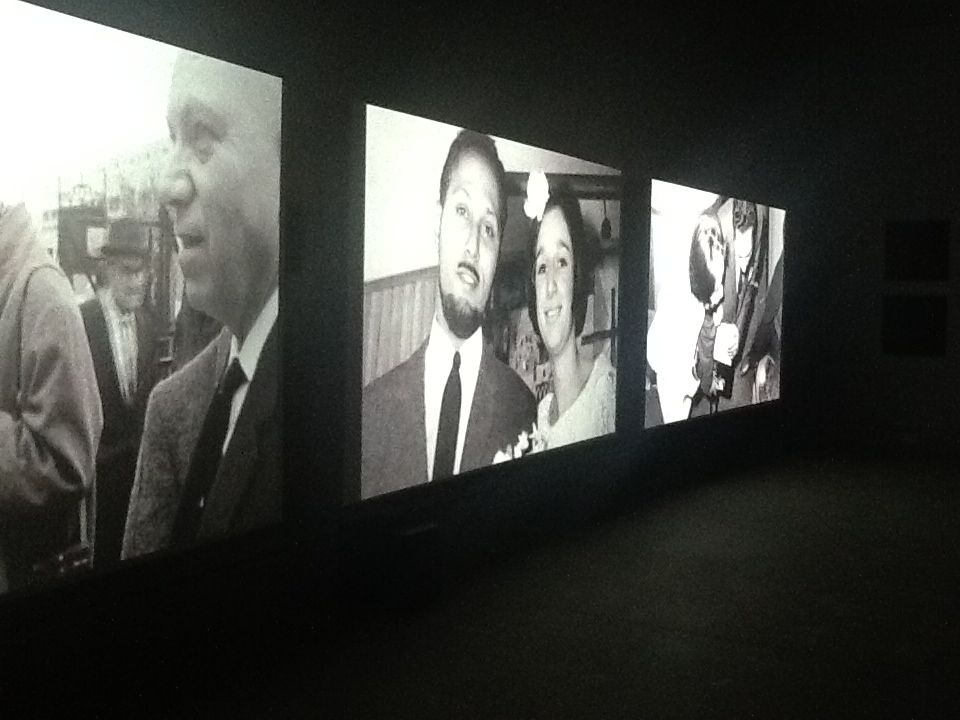Today I went back and forth to Liverpool across a storm-swept England to see two video installations at the Liverpool Biennale. Both were extraordinary and created such a set of resonances and memories that I’m going to have to write a full-length piece about it. It’ll still take two days to post. We have said, over and again, that to our friends and families we owe everything. The debt was posted due today.
The reason I traveled was to see this film by director John Akomfrah about the life of the British-Caribbean writer and theorist Stuart Hall. That’s Stuart in the middle screen above. To be more exact, while the Biennale lists Akomfrah as the artist, the film itself does not, giving full and widespread credit to the team that put the film together.
It’s a remarkable piece of visualizing theory and history. Shown on three screens simultaneously, the film visualizes, in a sense, what it must have been like to be Stuart Hall in his earlier career. The three screens would be showing personal photographs, filmed interviews from various periods, archive film and photography, news footage and so on. Meanwhile the sound would blend music, often jazz, with Hall’s commentary and radio interviews and other sound, such as the sea or machinery. It was a polyphony, edited so that all the sounds and images reinforced rather than disrupted each other.
I had the thought while watching that the film was like a Ways of Seeing for 2012, so it was resonant to see Mike Dibb, who worked on Berger’s film, acknowledged in the credits.
There were powerfully revelatory moments throughout. It turns out–did I somewhere know this?–that Stuart has Sephardic-Jewish in his family tree. In the film, we see his mother and that lineage is visibly apparent–it’s mine, too, so I’m allowed to say this. Was there some affinity that I had felt, having worked with Hall when I was a young activist and editor on Marxism Today, and always taking his thought to be a lodestone? Perhaps.
Many years later Kathleen, my partner, became close friends with Catherine Hall, Stuart’s wife of many years. To see a set of what I presume are their wedding photographs was very moving in ways that were also very overdetermined. Hall attended the same Oxford college as my father in the same time period. He says in the film that he knew at once that, while he could study there, he
could never be a part of it.
Years later those were my feelings exactly, although not my father’s, who liked it and has remained attached to his college.
Then comes the call across the years. It turns out that Hall was part of a group that opened a radical coffee shop in Oxford in the crisis of 1956. The Soviet invasion of Hungary changed a generation away from orthodox Marxism-Leninism and cultural studies would not have happened as it did without this break. At the same time, Britain and France invaded Egypt over the nationalization of the Suez canal, their last imperial folly.
Sitting in the coffee shop called The Partisan, with its sign designed in impeccable lower-case sans serif font, Hall was interviewed about his views. Time and again, he calmly stressed that he was angry, angry over the invasions, angry over the disregard for young people in Britain, angry that
for fifteen years at least we have been without any kind of moral or political leadership.
Out of that anger came the New Left Review.
Watching it now, over fifty years later, I felt intensely that we had somehow let this young man down, that it would be entirely possible for another such young man or woman to sit down today and say exactly the same thing. And it is indeed what we have been saying this past year. The spectre that entered the room was this question: will this demand still be unmet in fifty more years from now? Or was leadership perhaps the wrong thing to ask for? Reflecting back on 1956, a moment he felt “defined” him, Hall noted in terms so familiar to us:
Another history is always possible.
The film ends with this caption
For Stuart Hall. In gratitude. And respect.
My eyes filled with tears. In the crowded screening room, I was not alone.



Entered for Sundance film festival, this truly wonderful and delicately insightful film is a real treat.
Pingback: Unfinished Conversations Part Two | Occupy 2012
Dian, I’m going to be investigating whether it travels and I will report back
Wonderful, thanks so much for posting this. Hope the installation makes it across the Atlantic.